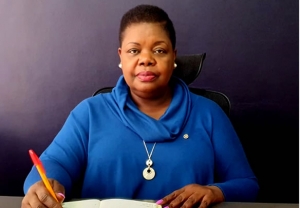Displaying items by tag: KEWOTA
PARTNERSHIP-BASED PLATFORM TO SUPPORT TRAINING OF TEACHERS AND PRINCIPALS
The creativity and resiliency of teachers is one of the reasons that the Kenya Women Teachers Association is proud of the teaching fraternity in Kenya.
Our teachers do more than just teach. Students often form bonds with teachers and rely on this trust to ask for advice and guidance, especially during times of personal or communal crisis. As has been demonstrated during the Covid-19 pandemic, our teaching fraternity has scored highly both in and out of the classroom
Both teachers and students have experienced isolation, uncertainty, grief, and loss during this time. And as the government through the Ministry of Education and the Ministry of Health work with other education stakeholders in recovering learning loss and keeping our schools open, we stand in solidarity with teachers in the quest for safer and healthier working conditions.
Championing the welfare of teachers, KEWOTA continues to play its role in empowering our teachers by giving them a voice, continually calling for safe spaces where teachers can work to develop our children is at the top of our goal.
A few critical issues jump out regarding teacher preparedness as our schools grapple with the health challenge. For instance, despite the ongoing national roll-out of the vaccination exercise, we are cognizant of the fact that children under the age of 12 years cannot be vaccinated.
In light of the impending fourth wave of infections, we urge for continuous discussions regarding the health protocols around teachers and staff who are more engaged with this age group in both primary schools and early childhood education
Ensuring all teachers get their double vaccination doses is imperative but above all we must maintain the health and safety of all teaching and non-teaching staff and environments. To make school environments safe, additional health and hygiene measures should be implemented.
In Nairobi’s primary schools for example, the availability of waterless hand sanitizer was associated with reduced prevalence of water borne diseases. Children were more likely to clean their hands after using the toilet if hand sanitizer was available (compared with soap and water)
We therefore strongly feel that providing young children with access to water less hand sanitizers in primary schools and ECDs will substantially lower the risk of infections and thereby protect our teachers.
Furthermore, use of thermometer-based screening coupled with teacher training on the management of suspected cases may allow teachers to detect fever in children upon school entry and exclude ill children from entry.
These measures in our view will go a long way in ensuring the safety of teachers who are exposed to the unvaccinated age group of pupils. Additionally, teachers who are increasingly facing the daunting task of supporting students in covering lost ground require new skills and capacities. They are operating in a modified environment, ensuring students recover by delivering an irregular syllabus.
Using our membership network as leverage, Kewota is prepared to partner with the Ministry of Education to promote school based psychosocial support to our teachers According to UNICEF assessments, many children and teachers continued to suffer symptoms of psychosocial stress, with symptoms including withdrawal, anxiousness, fear, denial and depression.
The UNICEF findings indicate that there was a serious need to develop the capacity of teachers and school staff to better support the psychosocial wellbeing of the children suffering from trauma and to deal constructively with problem behaviors arising from it. In addition, children were in need of services to help them overcome challenges and stress related to living in poverty
With schools consolidated and reorganized the needs for psychosocial support were enormous.
Recognizing that schools are both a place for learning and a place for children to overcome the psychosocial stress of emergencies, Kewota plans to mobilize a partnership-based platform to support training for teachers and principals to help them recognize signs of distress or impaired daily functioning among their students.
Benta Opande is the CEO, KEWOTA
ADDRESSING THE INSURANCE DISPARITY
Quality, accessible and affordable healthcare is a right to every Kenyan – but this is not the case with teachers today.
The launch of the Teachers Service Commission (TSC) medical scheme was a laudable move in many ways. Teachers often have very little time to themselves outside of work, and spending it navigating confusing, and frustrating healthcare service systems was not only an expensive affair but frustrating at best.
Since the inception of the Medical Scheme administered by Aon-Minet Insurance Brokers however, access to healthcare was streamlined leading to tremendous benefits for teachers
Previously, having not had a medical cover – with launch of Aon-Minet teachers could walk into the nearest healthcare facility on their medical panel and get med-care services without having to think about payment.
Until late 2019 or there about, the Scheme covered about one million teachers and their dependents, making it the largest such private medical scheme in the country.
The Scheme administrator, Aon-Minet was charged with ensuring that teachers are able to readily access medical facilities and the best services – at one point in time, the administrator had contracted over 1,500 healthcare facilities in its panel.
The biggest advantage of the medical scheme was the ease of access. Any teacher or their dependents could seek services from any facility anywhere in the country so long it was on the panel. Given the geographical spread of teachers in all parts of the country, this was a big boom for the teaching fraternity.
In fact, it reached a point where teaching in a Public school was the much sought for job ; this was largely because teachers enjoyed lavish healthcare benefits that appeared more valuable than any other reward a Public servant could get from the Government.
As we reflect on the performance of Aon-Minet since October 2015 when the Scheme was launched, we call on the TSC to audit the scheme’s impact on teachers’ health access. Quality, accessible and affordable healthcare is a right to every Kenyan – but this is not the case with most teachers today.
Teachers have taken an issue with healthcare providers, saying the Scheme is killing their moral as some of the contracted hospitals, health centres and clinics have literally turned away teachers insured by Aon-Minet.
It is even baffling when the insurance administrator contracts hospitals and other medical facilities that clearly lack the threshold to offer medical services because of lack of qualified personnel, drugs and medical equipment.
Teachers are not comfortable with some of the health facilities such as BLISS which operate intermittently between 8 am and 5pm – offering substandard services such as poor tests and diagnosis. These facilities besides offering poor services, do not provide round-the-clock medical services, thus teachers who fall ill at night fail to receive medical attention.
Specifically, teachers’ complaints centre at very low capitation on Outpatient services, with some capped at as low as Shs 900, inclusive of doctor’s consultations, tests and drugs. There are restrictions on the hospitals teachers are allowed to visit for treatment, some of which are ill-equipped and lack adequately trained personnel.
There are delays in approvals of payments, which sometimes take up to one month, hence putting the life of a teacher at risk. Significantly too is the fact that presently many teachers are facing challenges lodging claims with Aon-Minet. There is limited access to health facilities due to rigid operating hours. Worse still, there are limited dental services, where only tooth extraction is cared for by Aon-Minet. On dental services, the Scheme administrator doesn’t cater for crucial services such as cleaning, refilling, root canalling and tooth replacement. It is prudent that this issue is relooked to allow teachers to enjoy full healthcare benefits and ensure their well being is catered for.
Dorothy Muthoni is the National Chair, KEWOTA
THE STEADFAST CHAMPION OF WOMEN IN EDUCATION - BENTA OPANDE
The Editor had the pleasure of meeting Ms. Benta Opande, Chief Executive Officer of the Kenya Women Teachers Association - KEWOTA. A warm and amiable person, her story is one of passion, bravery and resilience. “I think realizing that you’re not alone, that you are standing with millions of your sisters around the world is vital.” – Malala Yuafzai. So this quote by Yuafzai is befitting and resonates very well with her journey from the classroom to CEO, of the largest Women Association in Kenya.
Ms Benta Opande is a teacher by profession, trained at Kenya Science Teachers Training College, KSTC. A career that started 35 years ago, she remembers fondly her first posting in 1989 to Parklands Boys Secondary School, where she began by teaching Chemistry, Biology and Sports. But it is in teaching sports where her passion for inspiring people to excel and push the limits was born, and was solidified when she became the first female coach of the school hockey team.
She recalls that when she started coaching the boys, the team was performing poorly but soon after, the performance began to improve, and by the time she left, the team had gained recognition and was winning accolades in the National sports arena. It had become the team to beat.
This impressive performance enabled her to get her next posting to Buru Buru Girls High School, where in addition to Hockey, she introduced Basketball. However, sports remained pretty much extracurricular activity, with her main responsibility being teaching biology and chemistry.
This went on for some time until her excellence in managing the Buru Buru girls’ sports department was recognized when her fellow teachers in Nairobi elected her as an executive committee member of the Nairobi Secondary Sports Association.
From Blackboard and Chalk to Advocacy
As she grew in her career in teaching, other members of the teaching fraternity who founded Kenya Union of Post Primary Teachers (KUPPET) had noted her passion for advocacy and in 2002, Mr. Tom Chariga, founder member of KUPPET approached her to join the union an opportunity she gladly took up because of desire to improve the plight teachers. During the subsequent election she vied for the First Assistant Treasurer where she won convincingly. She held this position for 11 years and during this time she remained the only lady in the top leadership at KUPPET.
Benta recalls her time at KUPPET as being bitter sweet. Working as the only lady amongst men made it extremely difficult for her to champion gender related issues. She says that lobbying and marshaling support was almost impossible. However after the promulgation of the new constitution in 2010, the opportunity to have gender balance arose. And she was finally able to lobby the KUPPET leadership and members to accommodate more women through affirmative.
This meant that women each of the 47 counties could now sit at the KUPPET National Governing Council and could take part in the decision-making process. She also lobbied for the creation of the position of The National Women Representative. A woman could now sit in the powerful National Executive Board. The current office bearer is Hon. Catherine Wambilianga, Women Rep, Bungoma County.
At this point she felt like she was better off at the Nairobi County office where she vied to be the Executive Secretary and won. Upon assuming office she was able to bring on board 79 post primary schools into the organization by creating a network of school representatives and kept this numbers growing.
But in 2012, KNUT impressed by her influence and dynamic leadership came knocking, and offered the opportunity to join their membership recruitment team as the Senior Executive Officer, in charge of recruitment. Taking this role with gusto, she grew the numbers of teachers at KNUT from 189,000 to 202,000.( Between October and December 2012) These numbers consisted mostly of post primary teachers.
Her stint at KNUT saw her begin building a network beyond Kenya. One important link that proved to be successful was her engagements with the American Federation of Teachers (AFT). By reaching out and engaging AFT she was able to get funding to develop operational manuals to support development of teachers.
Through this funding KNUT was able to come up with two manuals; the first was a strategic manual to help KNUT grow its membership numbers through empowerment of school representatives(POWER IN NUMBERS) and the other one to help train executive secretaries to understand the running of unions and leadership roles (EXECUTIVE SECRETARIES TRAINING MANUAL) KNUT soon after expanded her role to include recruitment and empowerment of ECDE teachers. The summary pamphlet developed by her is still in use at kNUT to date.
Her dedication to KNUT did not go unnoticed and when the gender docket fell vacant she was promoted to be Executive Officer in charge of gender at KNUT. This promotion pushed her to the fore of championing women issues in the teaching profession, and after a visit to Gambia to attend a ‘women in leadership caucus for teachers’ she together with a few women in the KNUT leadership decided it was time a teachers organization for women was realised.
KEWOTA REGISTRATION:
While at the KUPPET as the Ass. National Treasurer, Benta realized that she had a lot of time at her disposal that allowed to attend to issues that affected women teachers both at the classroom level and at the union leadership. Armed with empirical evidence, a vision and passion, she approached other like-minded women and registered Kenya Women Teachers Association (KEWOTA) in 2007. She got the support of SNV Netherlands and Dowatu from Ghana to assemble women teachers and share her vision how KEWOTA can help them articulate issues of gender in Kenya. From the very onset, she says that the stakes were against KEWOTA because most women were not convinced that they could succeed. They were concerned about the amount of work needed to be done and the potential obstacles.
However, she says that being consistent and focused has helped grow the Association day by day. She is humbled by how far KEWOTA has come and says that though the journey has not been smooth, she is finally happy to be steering a organization that aspires to see women teachers thrive. The Association she says is rearing to go with many initiatives in the world, including supporting women teachers through; Financial empowerment, with support of partners providing investment advice and opportunities, career and workplace advocacy and training.
In her words “ Women can do so much if they get support and are empowered. As an Association we appreciate all the challenges girls face especially teenage pregnancy, ability to afford sanitary towels, drop out rates being higher for girls when parents cannot afford to educate all their children, mental health issues among others. However our experience is that we have seen many women stand together to make these experiences bearable by assisting in various ways.”
KEWOTA
The Kenya Women Teachers Association (KEWOTA) is a vibrant welfare society and community for female teachers in Kenya. The Association consists of female teachers employed by the TSC, privately employed female teachers, ECDE female teachers, SNE female teachers and other women in the education sector.
The leaders are so passionate about women empowerment that some of them quit top national jobs, to advocate for female teachers and find ways to enhance better living standards for female teachers, especially those with families.
What the Association does for female teachers in Kenya
KEWOTA was founded not only to lobby and advocate on behalf of women teachers but also to enhance better living standards for female teachers and their families. KEWOTA does this through:
Financial empowerment, Investment opportunities, Development projects, Career and workplace advocacy, Sponsorship for both the girl child and women teachers, donations and - Training to mention just but a few.
To enhance service delivery, KEWOTA has established regional offices in counties across the whole country. Female teachers can contact or visit our officers to join the organization, report any career-related issues or request any of the services offered by KEWOTA.
Unlike education unions which focus on pressuring governments, KEWOTA mainly focuses on directly impacting the lives of female teachers socially, career-wise and financially.
Benta reiterates that there has been a lot of misinformation out there about the critical role the organization plays on a daily basis. The gender gap in teacher leadership still glaringly remains and so all education stakeholders are invited to embrace this organization for the betterment of all teachers including men
KEWOTA being a membership driven organization has seen a lot of successes and challenges. The greatest challenge faced is in increasing membership. Out of a potential of 200,000 possible members from TSC alone, KEWOTA is shy of only 30,000 members. The organization is seeking for partnership with like-minded organization in terms of training on negotiation, advocacy and lobbying skills. More needs to be done on creating a powerful team of school representatives.
Kewota is keen on capacity building of county representatives as peace ambassadors, paralegal officers and mental health champions.
The greatest threat to women empowerment and development is early pregnancy for our young girls. KEWOTA is addressing the matter by the developing a project called THE SEMA PROJECT( Sexuality Education and Mentorship for adolescents). KEWOTA hopes that in due course, partners will come on board to support this project whose end result will be the publishing of fliers, developing trainers and creation of awareness clubs in schools.
We sum up the Benta Opanda and KEWOTA intriguing journey and wishing her all the best as she continues to steer the KEWOTA ship “ Fight for the things that you care about, but do it in a way that will lead others to join you.” – Ruth Bader Ginsburg
EFFECT OF COVID19 ON TEACHERS’ WELFARE
It was one year ago, that COVID-19 turned our world upside down. For many, the biggest disruption from COVID-19 hit the education sector. The crisis led to school closures, heavily disrupting the learning process of more than 18 million students across the country.
Inevitably, the period away from the classroom took a social, emotional and academic toll on teachers and children. Of course, school closures are not new in Kenyan history. The period experienced during the coup attempt in 1982, when colleges and universities were closed for nine months in Kenya easily rivals the impact that COVID has had for the past year.
However, as the country comes to terms with this unprecedented disruption, little attention is being paid to the impact that school closures have on the lives of teachers. This is an important gap given that teachers constitute an essential workforce in all societies.
Indeed, there is no profession so intimately linked to the social and economic transformation of a country as the teaching profession. Being on the frontline of shaping the future of the next generation, it means that there is a compelling public interest and responsibility to protect those who practice our profession.
Before the current pandemic, the most prominent job stressors for teachers were mainly workload and behaviour management. Last year, the Teachers Service Commission released a report that found over 400 teachers sought mental health services across different health facilities in the country, in the month of April 2020 alone.
The report noted many cases of psychological distress among teachers that culminated in far- reaching consequences ranging from incidents of family separation/ divorces to suicide. COVID 19 pandemic exacerbated the situation.
In addition, UNESCO identified confusion and stress as one of the 13 adverse consequences of school closures. Working in education is exciting yet highly demanding, but often overlooked are the social and professional ties that the school environment impacts on a teacher’s mental health and well-being. This was so profound, that we have noted a negative effect among our members who developed mental health challenges as a result the COVID 19 caused disruption.
Sudden changes that involved removing teachers from their work environment became cognitively and emotionally taxing. For example, while at home, some teachers were forced to juggle with competing responsibilities such as home schooling their own children, caring for vulnerable family members, and/or managing their own mental health.
A combination of these circumstances presented a potentially highly stressful situation for teachers. Teachers should have the full support and encouragement of the government and leaders. They should never have to face mental and psychological challenges in isolation.
Women are a large and active component of the educational workforce and are more likely to experience (or at the very least, report) mental health issues than men. Special attention needs to be given to this group of individuals. The factors of being a woman and a teacher place these individuals at particular risk for developing depression, anxiety or burnout. Therefore, when it comes to promoting and addressing mental health concerns in and out of the classroom, Kewota advocates for the development of policies and plans that recognize the importance of integration of mental health into educational institutions.
The integration of mental healthcare into existing school health systems for example, can go a long way in early identification and effective intervention. Early intervention is critical. If left untreated, the symptoms of a mental illness may increase in severity, and its effects may become more serious and potentially life threatening.
It is KEWOTA’s view for instance, that before a teacher is interdicted, the employer should cater for a psychological assessment and therapy to ascertain the underlying issues of concern. Many teachers are suffering silently.
Equally, we propose the development and implementation of appropriate professional mental health training programs for teachers and other educators. Understanding what these issues are and the many different avenues available to effectively deal with them is an important challenge in today’s educational environment.
It is also important to implement infrastructures and support systems within our schools, for example, establish a mental health task force that can pioneer a program including education stakeholders, health experts and community links. Finding the answer to address mental health challenges are not always easy, and requires cooperation at all levels of the education system.
All in all, the camaraderie between teachers within the school and within the profession is an important resource that teachers can continue to use as they navigate the affective changes associated with the changes brought about by COVID‐19.
Benta Opande, Chief Executive Officer, Kenya Women Teachers Association
© Copyright 2025 EdSource Africa by BIL





